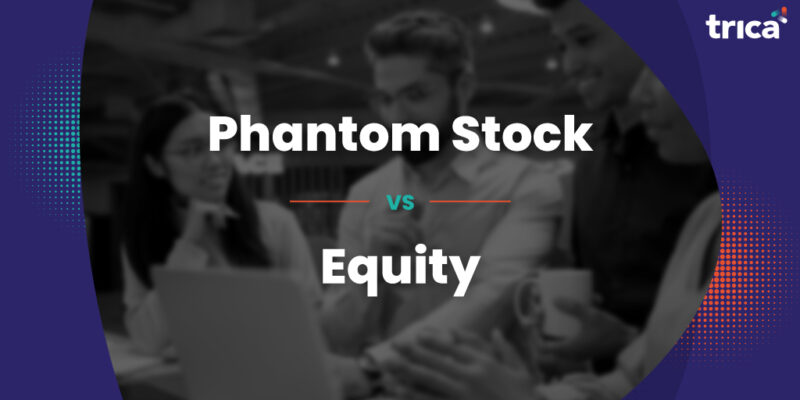
Phantom Stock vs. Equity: Which is Better For Your Business?
As a business, you want to attract and retain the right talent in the market. Offering stock options is a definitive way to meet these two critical goals.
However, as a company scales, offering stock options often becomes increasingly challenging. Also, it further dilutes equity ownership for founders who wish to continue controlling the company and reserve equity for the future.
This is where phantom stock becomes an attractive and viable option, a win-win for employees and companies.
In this blog, we deconstruct phantom stock and weigh its advantages vis-a-vis other stock options.
What is a phantom stock?
Phantom stock is a benefit that resembles typical stock options. However, it does not comprise equity stock, and instead, employees are issued “phantom shares,” which mirror the value of the equity stock of the business.
At any given time, the value of the equity share and phantom share is the same. Hence, if the equity share’s value rises, the phantom share’s value also increases.
The process of granting phantom shares is similar to that of stock options. There is a vesting period during which an employee for the grant must achieve certain milestones to translate into phantom stock.
Today, several publicly-listed companies, such as Birla Sunlife, Bajaj Allianz, and Cairn India, offer phantom stock to incentivize potential and existing employees.
Let’s delve into the specifics in a bit more detail.
Phantom stock: a deconstructed view
This is a snapshot of how the concept of phantom stock works:
- It Phantom stock is an agreement between a company and an employee wherein employees are issued phantom stock. However, they do not become shareholders in the business.
- There are mainly two types of phantom stocks – full value and appreciation-only.The former As the name suggests, full-value phantom stock grants employees the total value of the underlying stock once the vesting period is finished. On the other hand, appreciation-only phantom stock results in only the appreciated value of the stock being paid out to the employees after the vested period.
- The vesting period is a pre-determined time frame during which the employee must meet certain conditions to be eligible for receiving the phantom stock.For example, they may need to stay at the company for two years and deliver on specific business goals. On successful completion, they are eligible to be issued the phantom stock as a cash payment.
- Once the vesting period is over, the employee receives a cash payment which amounts to the market value of an equivalent number of equity shares of the company’s stock.
- Even though phantom stock is not the same as equity stock, it offers benefits such as an increase in the stock price and dividend earnings until it is fully vested.For instance, when phantom stock is granted to an employee, they may receive a dividend when the company issues a dividends to the stockholders.
- The specific terms of the contract, like the vesting period and milestones to be accomplished, may vary for different employees. The company has the discretion to outline the terms.
How are phantom shares taxed?
A key difference between phantom stock and stock options is that any profits earned on phantom stock will be taxed as ordinary income, not capital gains as it does . Hence, employees lose out on this crucial tax-saving benefit, which comes with being granted stock options granted.
Taxation is not triggered when the phantom shares are issued or the vesting period is complete. An employee is only taxed when the shares are redeemed, as is when the cash payout happens.
Which is preferable: phantom stock vs. equity?
Now the question is, should a company grant phantom stock or stick to usual stock options?
There are several factors to be considered before making such a decision. For example:
- Companies must evaluate the state of equity ownership and determine the impact of offering equity to employees based on the company’s future goals. If the founders do not wish to forsake more equity, they can consider offering phantom stock.
- The legality of offering stock options or equity is far more complex, as several regulations control the contracts. On the other hand, phantom stock contracts are relatively more uncomplicated.
- Some companies offer a mix of phantom stocks and stock options based on the employee’s profile and the hiring conditions.For instance, the senior leadership may be offered stock options, while less experienced employees may be offered phantom stocks. The policies can vary, as some employees consider stock options more valuable.
- Cash flows and liquidity of a business play an important role, too. Say an employee leaves the company without vesting their phantom shares; they will need to be paid a cash amount equal to their value.To avoid a situation where a company has to doll out a large amount in one shot, the contract can lay down the terms for payment based on the company’s cash flow.
For instance, an installment plan can be outlined to stage the payout. Hence, taking a company’s cash flow capability is crucial before offering phantom stock. - Founders must keep in mind another important factor when issuing phantom shares. When they decide to sell the business, each phantom share’s value is equated with an equity share’s transaction price.
Key Takeaway
Businesses must consider their options carefully before going for either equity compensation or phantom stock. Both will impact the financial future of the business.
Hence, such decisions must be taken, keeping the long-term sustainability and profitability of the business in mind.
To simplify the process, businesses could consult with a specialist in equity compensation to understand whether phantom stock or equity is best suited for their business.
trica is a state-of-the-art stock options management tool offering a superior experience when issuing stock options programs. This end-to-end solution is an excellent investment for businesses looking to hire and retain the best talent, with phantom stocks as an offering.
Book a demo today to know more!
ESOP & CAP Table
Management simplified
Get started for free



